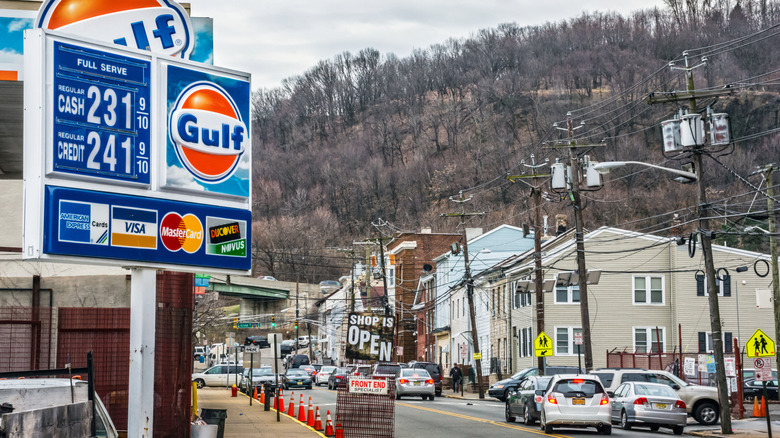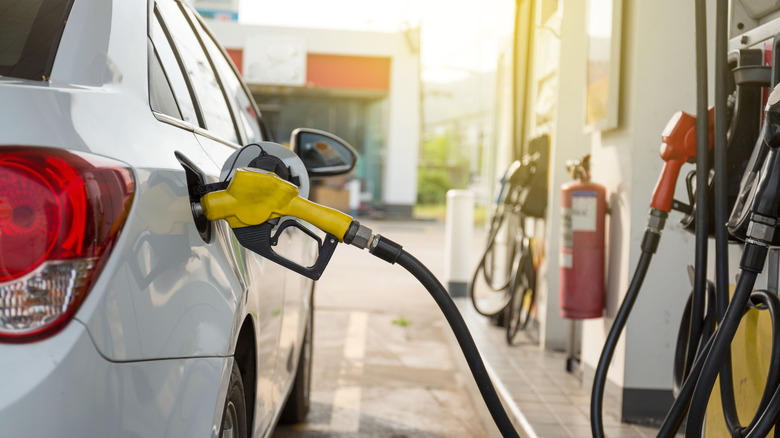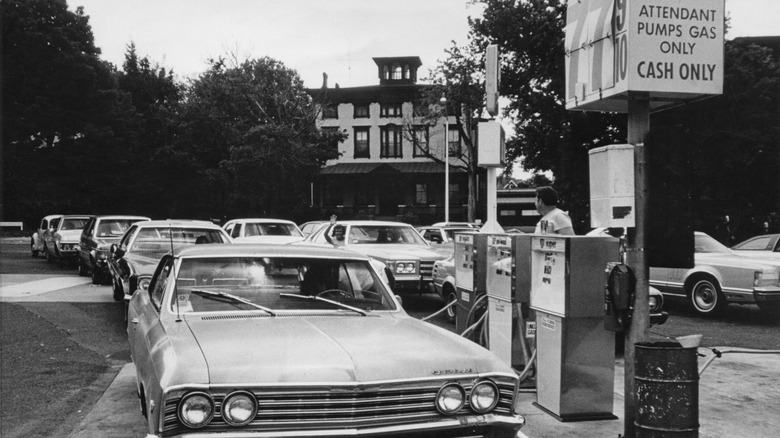The Bizarre New Jersey Gas Station Law You Don't Want To Break
Some folks might be old enough to remember when gas station attendants strolled out to your car when you rolled up to a pump. They came to the window, asked what you needed, had one of those window washing wipers and a bucket of sudsy water in hand, and maybe even smiled. But, it's definitely cheaper for a gas station to not pay people. Enter the less dignified world of self-serve pumps and all the filthy hands gripping that same handle that you grip as you pump gas and gaze into the distance wondering at the purpose of conscious existence. Unless you're in New Jersey, that is (which may have you questioning existence for completely unrelated reasons).
For people living in New Jersey, the tale of bygone full-service gas pumps might sound less like 1984 and more like 2024. In New Jersey, it's not just that gas stations prefer full-serve pumps, or that it's difficult to find self-serve pumps. Self-serve pumps are actually 100% illegal in the Garden State. And in case you're wondering, New Jersey is the only U.S. state where this is the case.
So where does this weirdly restrictive law come from? Well, it comes from a time when you'd fully expect full-serve to be the norm: 1949. Back then, as CNBC says, state legislators passed the Retail Gasoline Dispensing Safety Act to ensure safety at the pump and to prevent rising gas costs from causing stations to switch to self-serve. Yes, to prevent them from switching.
Self-serve rules and punishments
As the New Jersey Department of Labor and Workforce Development cites the Retail Gasoline Dispensing Safety Act, "No person shall dispense fuel at a gasoline station, unless the person is an attendant who has received instructions regarding the dispensing of fuel, had practical experience dispensing fuel under the direct supervision of an experienced operator for a period of not less than one full working day." An attendant is defined as "a retail dealer or employee of a retail dealer," and has to demonstrate an understanding of fuel-dispensing instructions. Other provisos include describing an attendant's exact four duties, what qualifies an "attendant" to be an attendant, and three specific types of instructions an attendant needs to receive.
The penalties for defying this law aren't enormous, but they're also not trivial. There's a $50 minimum and $250 maximum fine the first time someone breaks this law, and a $500 fine each subsequent time plus "summary proceedings pursuant to 'the penalty enforcement law'" in the particular country where the offense occurred. How someone could possibly break this law is a little unclear, as it would be tough for a driver to — what? — drive up to a pump, leap out, and pump his own gas before anyone working at the station intervenes? Then again, the law seems to target those who sell gas, not buy it. Meaning, someone would have to be not an official "attendant" in order to break this law, and then the police would have to somehow find out.
Pushback against the law
So why hasn't New Jersey's 75-year-old full-serve law changed? As Monmouth University reported in 2022, about 55% of folks in New Jersey see full-serve gas as a "good thing" that New Jersey offers only full-serve pumps. At the same time, 54% of people would support self-serve if they also had the option to go full-serve, but only 37% would support self-serve if they were forced to choose it. More to the point, 70% would choose self-serve if it was cheaper, which is the exact reason that the conversation started in 2022: because of how the Ukraine-Russia war affected gas prices. State legislator Annette Chaparro on ABC30 Action News reiterated this sentiment at the time, saying, "Everyone's in a rush, so if you can pump your own gas, save 15 cents or more per gallon, why not? If you don't want to, it's your option."
Every other state has already come to this conclusion, but only recently. It took until 2023 for Oregon to repeal its own 72-year-old ban on self-serve pumps outlined in House Bill 2426. This doesn't mean that full-serve pumps are outlawed, only that 50% maximum of the pumps at a station have to be self-serve. Each station still has to have an attendant on hand, and full-serve and self-serve have to be the same price. This means that stations have to eat the costs for full-serve pumps. But until such measures get passed in New Jersey, folks can roll into Garden State gas stations and pretend it's 1949.


